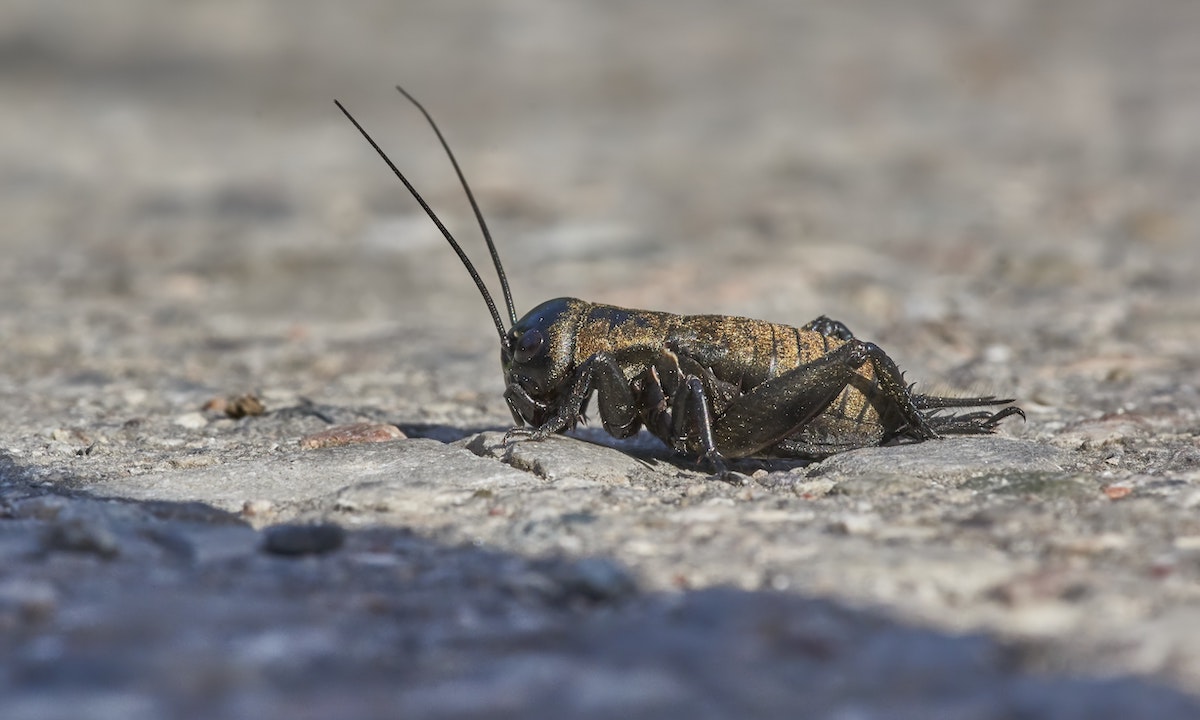Bug Burgers? Crickets Replace Cows in the Future of Sustainable Food
Cricket, mealworms and other insects might provide a bigger benefit for human consumption compared to traditional livestock. But we’ll have relearn our relationship to insects before we get there.

Does the thought of eating bugs make you cringe? You’re not alone, especially in further north areas like Michigan.
“We have these harsh winters, [so] insects aren’t available,” says Julie Lesnik, an anthropology professor at Wayne State University who specializes in the evolution of the human diet and using insects as a food source. “It’s not a part of a lot of traditional diets in higher latitudes.”
“This isn’t just something that primitive people eat, this is a food resource that has been smartly used for millions of years and in a lot of ways we are silly for ignoring it.” – Julie Lesnik, professor
But Lesnik makes the argument that eating — and farming — insects may make sense for a growing population where our food system leads to growing inequity, hunger and obesity. Bugs are also an environmentally-friendly food source and rich in nutrients, and a culture built around it with recipes and even a business in metro Detroit.
Listen: Julie Lesnik on the colonialist history of bug aversion and the case for an insect-based farming.
Still not ready to join the ranks of the entovegans, individuals who only eat insects and plant-based foods? WDET’s Anna Sysling spoke to Lesnik on the colonialist history of our bug aversion, the case for an insect-based farming system and how you can start dabbling in this diet.
You Must Love This Planet
Otherwise, how did you get here? 101.9 WDET wants to connect with metro Detroiters who are concerned about climate change and want to take action. Sign-up to be contacted by our editorial team to learn more.

The Problem
Lesnick says the problem with our current food system is wasted resources.
It’s about “how much resources we put into cows versus what we get back out of them,” says Lesnik.
Lesnik says according to estimates, it takes about 22,000 liters of water to cultivate a kilogram of edible mass for cows, which is a little over two pounds, and it takes a couple hundred liters of water to produce that same kilogram of edible mass for crickets.
“So really fresh water is one of the things we should be thinking about as a very precious resource and so adjusting how we farm our animals is an important part,” she says.
The Solution
Insects are something we have been eating for millions of years, but fallen off here in the U.S.
Lesnick points to a conflicted history of colonialism as one reason why, as evidenced by correspondence and letters she’s uncovered through her research.
“By eating the whole insect you’re actually getting a greater variation of nutrients than if you were just eating meat.”
“In a journal entry from [Christopher] Columbus’s companion on his second voyage, they highly scorn the use of insects as food,” Lesnik explains. “As Europeans, their only association with insects and food might be maggots with rotten meat.”
Lesnik says that Columbus and other colonizers uses indigenous people’s diets as one way to dehumanize and eventually enslave them to work on sugar plantations.
But she notes that “right now there is a lot of excitement about farming crickets and mealworms.”
She adds that both of these insects are great alternatives when thinking about different options for food.
The Whole Bug Diet
Lesnik says “one thing about eating meat in our diet is that it’s a really easy way to get all the complete proteins that we need.”
That means you can easily get all the essential amino acids from one place, explains Lesnik, whereas if you’re a vegetarian you need to be very smart about pairing all your food sources.
“By having strong disgust reactions at the idea of eating insects we are eliminating that as a possible resource for these future generations.”
She says insects offer that same animal protein, so they have that same benefit. “But unlike eating the flesh of a cow or a pig, we are eating the entire insect so even if you are eating it powdered we get iron, dietary fiber. By eating the whole insect you’re actually getting a greater variation of nutrients than if you were just eating meat.”
Insects also offer a unique ethical alternative for vegetarians, says Lesnik.
“Cows are roaming animals and we put them into these small areas, but crickets naturally live in dark and cramped spaces, so to farm them in these containers for food is not far removed from their natural habitat,” Lesnik continues. “They are not nearly as stressed as other animals that we farm.”
What Can You Do?
Even with these facts, Lesnik says you may run into opposition among the uninitiated.
“They might have a real honest disgust reaction,” she says, complete with a churning stomach and gag reflex. “It’s hard to tell that person that their reaction is cultural.”
She says that the “disgust reaction” is developed when we are young.
“Think of a two-year-old, they put anything in their mouth and it requires the adults around them to say ‘oh no don’t put that in your mouth,” and she says that our learned reaction helps form the pathways in our brains as toddlers as to what is disgusting. “So by having strong disgust reactions at the idea of eating insects we are eliminating that as a possible resource for these future generations.”
She says ultimately we need to “change the narrative” around bugs and insects.
“This isn’t just something that primitive people eat, this is a food resource that has been smartly used for millions of years and in a lot of ways we are silly for ignoring it.”
Support the news you love.
Here at WDET, we maintain our journalistic integrity through independent support from readers like you. Because you value WDET as your source of news, music, and conversation, please make a gift today.

